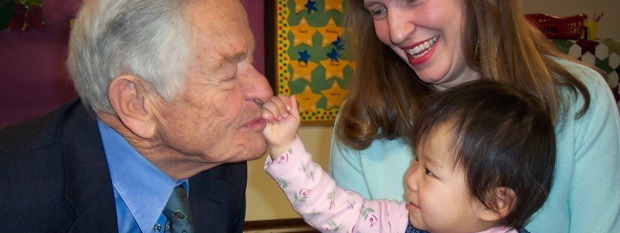 Our knowledge about what’s going on in babies’ brains in their earliest days, weeks, and months has grown by leaps and bounds in the last 65 years, and Dr. T. Berry Brazelton has seen it happen. But more than just watching, Dr. Brazelton has been an instrumental force for change in how we understand and treat the needs of babies.
Our knowledge about what’s going on in babies’ brains in their earliest days, weeks, and months has grown by leaps and bounds in the last 65 years, and Dr. T. Berry Brazelton has seen it happen. But more than just watching, Dr. Brazelton has been an instrumental force for change in how we understand and treat the needs of babies.
When his career as a pediatrician began in the 1940s, Dr. Brazelton found himself in a field where the common assumption was that children were born unformed, blank and waiting for the world to shape them. It was a belief taken to such extremes that it wasn’t unheard of for children to undergo surgical procedures without the benefit of anesthesia or be kept in unforgiving intensive care environments that isolated them from their parents. Dr. Brazelton and other doctors of the time began to realize that children were far more complex at birth than they’d ever been given credit for.
One of the things that stood out to Dr. Brazelton was that babies, even immediately after birth, showed great differences in temperament and personality. They were already unique individuals responding to the world around them. Where it had been believed that babies learned how to behave from their parents, Dr. Brazelton began to realize that the learning process goes both ways. Parents and babies influence each other’s behavior and responses in a constant cycle of learning and adapting.
When Dr. Brazelton developed the Neonatal Behavioral Assessment Scale (NBAS) in the 1970s, it represented a major departure from previous methods of assessing infants. Where other assessments sought to identify “abnormalities,” the NBAS tied into the idea of understanding the baby as an individual, recognizing that there isn’t necessarily one “right” way for a baby to react to stimuli. Rather, it helps parents understand who their baby is and what steps they’ll need to take to best support healthy physical and emotional development. It is, as described at the Brazelton Institute website, a test in which “examiners are trained to get the best performance from the child be doing everything possible to support the infant in ‘succeeding.’” It’s not about identifying what a baby does right and wrong. It’s about understanding how that particular child is relating to the world and how parents and doctors can best engage and help as he or she grows.
Throughout his career, Dr. Brazelton has prioritized helping parents and providing them with the knowledge they need, whether it was through his long-running television series What Every Baby Knows, his Touchpoints series of books, or through the work of the various organizations that he has founded and worked with.
For his decades of service to children in the U.S., specifically his early and continuing commitment to the Head Start program, the White House recognized Dr. Brazelton as one of their Champions of Change in June of this year.
Dr. Brazelton’s response to receiving this honor?
“I’m 94 years old, but I’m not done. There’s more to do.”
Dr. Brazelton is right. There’s still much more we can do improve the lives of babies, but we are much further on the path that would would have been without his efforts.
For more information about Dr. Brazelton and his research and work:
- The Brazelton Touchpoints Center
- Dr. Brazelton’s Blog @ Huffington Post
- Changing Times for Children – Harvard Magazine Profile
- Understanding the Language of Childhood: Lessons from the Research of Berry Brazelton
Source of the photograph above: The Brazelton Touchpoints Center







Thank you for reminding us of the work that we all need to do! I’m proud to be a Touchpoints trainer as well as PITC PQ Infant Toddler Specialist! I agree with DR B…”there’s more to do”! We need to learn from Dr B and so many others on how to be Champions of Change! I’m ready…
I love the fact how Dr. B. states that it’s not about a babies rights and wrongs that it commits, but instead how it relates to his/her surroundings. I agree, the surrondings can possibly be the reason that triggers these effects. Great way to observe and judge the babies overall development instead of just picking out one or two things to focus on.
This man has done a lot of great work toward learning , researching on infants. I totally agree with what he is saying our babies are equipped with when they are born. He sure explains a lot of information regarding babies. My thanks for his work and information provided for me to better understand babies.
Thank you to Dr. Brazelton and his amazing research, helping us understand so much more about infant development. It is a blessing that Dr. Brazelton has shared his wealth of information, allowing infants to receive the highest level of care at home and at childcare centers, and continues to broaden our knowledge of infant development.